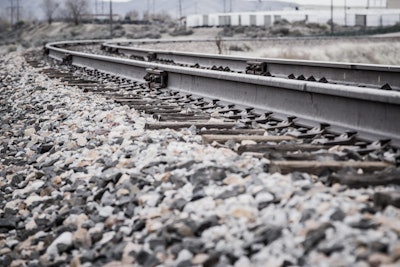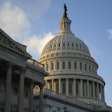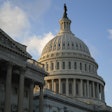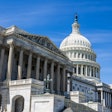
On Wednesday, the U.S. House of Representatives voted to approve a bill to block a potentially crippling railroad strike and to mandate paid sick time for rail workers.
The House voted 290 to 137 — with 79 Republicans joining 211 Democrats — to pass the legislation, which approves new contracts providing railroad workers with 24% pay increases over five years from 2020 through 2024, immediate payouts averaging $11,000 upon ratification, and an extra paid day off.
The bill now goes to the Senate, where Majority Leader Chuck Schumer, D-N.Y., promised swift passage.
The House separately voted 221 to 207 to give seven days of paid sick leave to railroad employees, but that faces an uncertain fate in the Senate.
“The U.S. railway system is vital to movement of grains and co-products to export markets," said Ryan LeGrand, U.S. Grains Council president and CEO. "The federal government, the railroads and the private sector should work together to assure no shutdown occurs. Ratifying the tentative agreements already in place is a step in the right direction to coming to a solution agreeable to all parties.”
The North American Millers' Association (NAMA) was grateful to the Biden administration and House representatives for moving quickly to avoid a shutdown and urges the Senate to act swiftly.
“The milling supply chain relies on rail," said NAMA President Jane DeMarchi. "Even a short-term strike would have an enormous negative impact, leading to supply shortages and higher prices on household staples for consumers."
No contingency plan if rail shuts down
On Tuesday, the Association of American Railroads held a press conference to discuss the state of ongoing rail negotiations, the impacts of a potential rail strike and potential Congressional intervention.
Featuring a panel of CEOs covering a cross-section of sectors, from retail to fertilizer to feed and grain, the consensus was a rail strike would be catastrophic to all in the U.S. with no contingency plan to move products and commodities if rail shuts down.
Brian Dodge, president of the Retail Industry Leaders Association (RILA), noted the last year and half has been spent untangling the supply chain from COVID gridlock.
"We can't just pivot and shift if there's a rail strike," said Dodge. "There is zero elasticity in transportation right now."
The panel noted trucking shortages and low water levels on the Mississippi River hindering barge shipments as concurrent challenges to the U.S. supply chain.
Just-in-time feed and grain industries have additional challenges
Representing more than 1,000 grain, feed, processing, exporting and other grain-related companies, National Grain and Feed Association (NGFA) members rely heavily on rail transportation to move U.S. grain and grain products.
With the possibility of a strike looming, NGFA President and CEO Mike Seyfert noted the just-in-time nature of the feed and grain industries is creating a need for members to preposition commodities and feed, which creates additional costs and challenges for them.
"Take the processing side, for example" said Seyfert. "Processors have three to 10 days of storage for soy meal, ethanol or flour. You have to move the product when it's processed. They can't preposition if they don't have the storage to process."
Leah Wilkinson, American Feed Industry Association (AFIA), vice president of public policy and education, speaking with Feed Strategy on November 28, said any threat of a strike means that deliveries will slow down even before they strike.
"When that happened back in September, we had facilities that were very close to, if not running out, of soybean meal, or corn or other ingredients," said Wilkinson. "That doesn't put any of us in a good spot when we can't feed the animals that are relying upon us to provide them the feed and nutrition that they need."
Biden calls on Congress to intervene to avert rail strike
On Monday, President Biden issued a statement calling on Congress to pass legislation immediately to adopt the tentative agreement reached in September between railroad unions and management to avert a potential rail strike.
Biden said the secretaries of Labor, Agriculture and Transportation have been in regular touch with labor leaders and management and believe there is no path to resolve the dispute at the bargaining table. The secretaries recommended the administration seek Congressional action.
"The economic impact of a shutdown would hurt millions of other working people and families – I believe Congress must use its powers to adopt this deal," said Biden.
Biden said some in Congress want to modify the deal to either improve it for labor or for management.
"However well-intentioned, any changes would risk delay and a debilitating shutdown," he said. "The agreement was reached in good faith by both sides."
Is there hope at the end of the tunnel?
Seyfert and other panelists commended the president for calling on Congress to act immediately to prevent a rail shutdown that would hurt the U.S. agricultural and broader economy. Seyfert also thanked Speaker Pelosi for responding with urgency to this critical supply chain threat.
"Nothing is ever a certainty until Congress takes final action, but with the legislative proposal mirroring the agreement negotiated between the president, labor and the railroads in September, we are very hopeful the threat of the impact a strike would have on the food and agriculture and broader economies will lead to quick, bipartisan action," he said.
All the CEOs on Tuesday's panel were hopeful a bipartisan showing would quickly move the legislation to Biden's desk.
"The last time Congress intervened in a rail strike was 1992," said Jeffries with AAR. "We're hoping for the same bipartisan cooperation in this moment."
The impact of the two-day rail strike and subsequent shutdown in June 1992 was so severe that the federal government swiftly intervened to end it. The House and Senate passed a bill on June 26, 1992, banning both strikes and lockouts, which was then signed by President George H. W. Bush the same day.
Seyfert said this is a reminder of what's at stake not just for the agricultural industry but for the world if there's a rail strike.
"A rail strike or lockout would lead to shutdowns or slowdowns of rail-dependent facilities resulting in harmful consequences to our national and global food security," he said. "NGFA urges Congress to deliver a bipartisan bill to the president’s desk well in advance of the December 9 deadline."
For the latest update, click here: Rail strike averted
















